- Home
- Joan Lowery Nixon
Spirit Seeker
Spirit Seeker Read online
Books by Joan Lowery Nixon
FICTION
A Candidate for Murder
The Dark and Deadly Pool
Don’t Scream
The Ghosts of Now
Ghost Town: Seven Ghostly Stories
The Haunting
In the Face of Danger
The Island of Dangerous Dreams
The Kidnapping of Christina Lattimore
Laugh Till You Cry
Murdered, My Sweet
The Name of the Game Was Murder
Nightmare
Nobody’s There
The Other Side of Dark
Playing for Keeps
Search for the Shadowman
Secret, Silent Screams
Shadowmaker
The Specter
Spirit Seeker
The Stalker
The Trap
The Weekend Was Murder!
Whispers from the Dead
Who Are You?
NONFICTION
The Making of a Writer
“They were murdered?” I shivered, shoving away the horrible image, terrified at what Dad would say next.
Dad looked at me and grimaced as if he were in pain. “Yes. The people who were murdered were Cody’s parents.”
Words battered themselves against the blackness in my mind and wouldn’t take shape. “Cody?… Cody? What happened to Cody?”
Dad stretched out one big hand, clumsily patting my shoulder as if he didn’t know what else to do. “Cody wasn’t there, Holly,” he said. “Two cars were in the three-car garage, both of them registered to his parents. There was no sign of Cody or his car.”
This is a work of fiction. Names, characters, places, and incidents either are the product of the author’s imagination or are used fictitiously. Any resemblance to actual persons, living or dead, events, or locales is entirely coincidental.
Text copyright © 1995 by Joan Lowery Nixon
Cover illustration copyright © by Tim Barrall
All rights reserved. Published in the United States by Delacorte Press, an imprint of Random House Children’s Books, a division of Random House LLC, New York, a Penguin Random House Company. Originally published in hardcover by Delacorte Press, New York, in 1995.
Laurel-Leaf Books with the colophon is a registered trademark of Random House LLC.
Visit us on the Web! randomhouse.com/kids
Educators and librarians, for a variety of teaching tools, visit us at RHTeachersLibrarians.com
Library of Congress Cataloging-in-Publication Data is available upon request.
eISBN: 978-0-307-82351-9
First Delacorte Press Ebook Edition 2013
Random House Children’s Books supports the First Amendment and celebrates the right to read.
v3.1
For Carol Farley
with love
Contents
Cover
Other Books by This Author
Title Page
Copyright
Dedication
Chapter One
Chapter Two
Chapter Three
Chapter Four
Chapter Five
Chapter Six
Chapter Seven
Chapter Eight
Chapter Nine
Chapter Ten
Chapter Eleven
Chapter Twelve
Chapter Thirteen
Chapter Fourteen
Chapter Fifteen
About the Author
Chapter One
Saturday. 2:00 A.M. Through the silence of the house came the creaking of the front door, the thud of dead bolts slapping into place, and the padding of muffled footsteps toward the kitchen. I had been lying in bed, waiting for him. With only a cold hollow where my stomach ought to be, I slid out of bed, threw a robe over my T-shirt, and ran barefoot down the stairs to confront my father.
Even though I was furious, I was frightened too. Don’t get me wrong. I wasn’t afraid of my father. I was scared of what he was doing to Mom … and to me.
I paused in the kitchen doorway and watched Dad pour a glass of milk. In the yellow light from the open refrigerator door, he looked awful. In spite of the fact that he’s a tall, good-looking man, tonight his broad shoulders slumped inside a wrinkled, sweat-stained shirt, and his tie hung askew. The lines in his face sagged with exhaustion, and smudged circles darkened his eyes.
“Dad, where were you?” I demanded.
He gave a start, sloshing the milk, which splatted against the faded linoleum floor; and as I flipped on the light switch, he squinted against the sudden brightness. “Oh, Holly,” he said. “It’s you.”
Who else would it be? Not Mom. She’d be awake, I knew, lying curled in a ball, the blanket and sheet pulled almost over her head; but the last thing she’d do would be to come downstairs and confront Dad. Even when he went upstairs, Mom would pretend to be asleep.
Dad wearily unbuckled his shoulder holster and laid the holster and gun on the table. “Sit down, Holly,” he said. “I need to talk to you.”
I didn’t want to hear what he had to say. I had something to say first. “Dad,” I blurted out before I could change my mind, “you stood Mom up again. And she bought a new dress and got her hair done. What happened? Why didn’t you call her?”
For an instant he looked bewildered. “Call her? I was on a case,” he said.
“You just got off a case. You were supposed to be home for two days and take Mom out tonight to celebrate your anniversary.”
Dad squeezed his eyes shut and rubbed his hands over the tight wrinkles that squiggled across his forehead. Mumbling against his palms, he said something that sounded like “Anniversary? Yeah, tonight.”
“Last night,” I said. “It’s already morning.” My anger returned in a hot wave that bubbled up in my throat. Mom wasn’t the only one Dad had stood up. I knew the feeling well. My class play—sure, it was a small part, but Dad had promised to be there—and my sixteenth birthday. Dinner at the elegant Charlie’s 517 and tickets for a Broadway road show afterward at Jones Hall. The three of us. Only, as usual, it turned out to be just Mom and me.
Forget all that, I told myself. Right now, this isn’t about you. It’s about Mom and Dad and what might happen to them.
“You made Mom cry again. How could you not come home?” I asked him. I could have stopped there, but I didn’t. Anger kept me going. “For a long time Mom stood at the window, watching the street, hoping you’d get home on time. I knew she’d given up when she called the restaurant and canceled the reservation. She went up to your room, shut the door, and cried. I could hear her.” Defensively, I quickly added, “It wasn’t disappointment about not going out to dinner. It was hopelessness because you didn’t care enough to show up.”
I stopped abruptly, not wanting to tell him I had also heard Mom’s explosive fury and the words “I’ve had it. What’s left but divorce?”
Dad just sighed and answered, “Your mother understands what a homicide detective’s workload is like, Holly. You’re sixteen. You’re old enough to understand too.”
“Well, I don’t, and I think she’s getting tired of having to be so understanding,” I said. “There’s a whole staff of detectives in your department. Do they all get so involved in solving a case that they hardly come home at all? I don’t think so.” I reached for the word Mom had used. “You get obsessed with what you’re doing. That’s what the problem is.”
Dad’s jaw jutted stubbornly in a look I knew well. “You don’t know what you’re talking about. After a murder’s committed, time runs out fast. We’re talking about two—maybe three—days to look for clues and track down witnesses before the trail turns stale. And on top of everything else, we’ve got to try to
keep curious neighbors, relatives, and the media from crowding around and accidentally destroying vital signs. Finding time to call home is often impossible. You know all this. Don’t make me explain it again.”
“Just a short call would keep Mom from feeling abandoned and from worrying,” I persisted. This had happened so many times, ever since I was old enough to be hugged by Mom and smothered by the chill of fear that crept from her as we waited for Dad to return home—hours and hours late because he’d been working on a case.
I’d heard Mom beg Dad more than once, “Listen to me, Jake. Please, Jake. Why don’t we move to a small town where there isn’t as much crime as there is in Houston?”
But Dad had shaken his head. “No, Lynn. No small towns. You knew what my job was like when you married me. I’ve worked hard, and I’m respected here. Do you want to downgrade me to riding a desk or writing traffic tickets?”
Dad’s voice broke into my thoughts. “Are you through with the recriminations, Holly? Because there’s something important I need to tell you.”
“You already told me,” I muttered, “about how you have to work on cases, and you don’t have time to call, and—”
Dad reached out and gripped my shoulders, practically pushing me into the nearest kitchen chair. I was so startled, my mouth and eyes flew open.
“Pay attention,” he said as he settled facing me. “You’re making this difficult. I have to ask … I need to know.… That boy you brought over here—Cody Garnett—”
Still defensive, I interrupted him. “I didn’t just bring him over here, and he isn’t ‘that boy.’ Cody and I have been friends since junior high. And now we’ve started dating.”
Before Dad could answer, I went on. “You don’t even know most of my friends. You didn’t pay attention to Cody until he came to take me out on a date. You made it plain that night that you didn’t like Cody much, even though you don’t know him. He’s really a neat guy. He was just shy about meeting you, and that’s why he couldn’t seem to find anything to say. But he’s got a great sense of humor, and Mom likes him, and—”
Dad shook his head impatiently. “We’re not talking about what I think of Cody. I want you to answer some questions for me. Have you met his parents?”
“Of course.”
“How well do you know them?”
I shrugged. “They’re just parents. Okay? They seem like nice people.”
Dad frowned. “Holly, did you have a date with Cody tonight?”
“Why are you asking about Cody? What does Cody have to do with anything?”
“Just answer me, please.”
“No, we didn’t have a date.”
The slight hiss of air through Dad’s teeth was like a sigh of relief. “Do you know where he is?”
“He said something about having to go to his family’s lake house.”
“Which is …?”
“Lake Conroe.”
“For what reason?”
“There were some clothes he left there last month, like his new sports coat. His mom wanted him to wear it to some big thing they’re all going to on Sunday and was upset that he’d forgotten to bring it home, so Cody decided to drive back to the lake house and get all his stuff.”
“He has his own car?”
“Yes.”
“Was he planning to spend the night at Lake Conroe?”
“I think so.”
“Do you have any knowledge of when Cody planned to get back to Houston?”
“No.”
Dad pulled a notepad and pen out of his shirt pocket. “How about an address or phone number for this lake house?”
“I don’t know. I … What are you doing?” I complained. “I feel like you’re interrogating a suspect, and I’m the suspect.”
“I’m sorry,” he said. “These are questions that need answers, and I’m hoping you can help supply them.”
“What for? You haven’t told me why you’re asking about Cody. What’s going on?”
Dad waited a full minute, his eyes searching mine, before he spoke, but his voice softened as he said, “Holly, it’s bad news.”
The look in his eyes scared me, and it was hard to breathe. I whispered, “What kind of bad news?”
“I’d better start from the beginning, so you’ll get the whole picture,” Dad answered, his words dragging with a painful reluctance. “The police were called to a house where music was playing so loudly it disturbed a neighbor. The neighbor tried telephoning the occupants of the house, and when no one answered, he went to the house and peered through a living room window. He could see the man and wife lying facedown on the floor. He could see … blood, so he called the police.”
“They were murdered?” I shivered, shoving away the horrible image, terrified at what Dad would say next.
Dad looked at me and grimaced as if he were in pain. “Yes. The people who were murdered were Cody’s parents.”
Words battered themselves against the blackness in my mind and wouldn’t take shape. “Cody?… Cody? What happened to Cody?”
Dad stretched out one big hand, clumsily patting my shoulder as if he didn’t know what else to do. “Cody wasn’t there, Holly,” he said. “Two cars were in the three-car garage, both of them registered to his parents. There was no sign of Cody or his car.”
Chapter Two
I woke up Mom, and she held me tightly, rocking back and forth on the edge of the bed, murmuring against my hair. When Dad came in, she pulled him down beside her and said, “Oh, Jake, how terrible! Cody’s parents! Oh, Jake!”
Mom seemed to forget she was angry at Dad, and for a few minutes I could imagine that Mom and Dad loved each other just as much as they had when the house was warm and snug with the feelings that come with being a close, united family.
“We have to find Cody,” I mumbled.
“We will,” Dad said. “I contacted the police in Conroe. They had an address for the Garnetts’ lake house.”
I could picture uniformed cops knocking at Cody’s door, waking him in the darkness with the news about his parents. Strangers telling him. People who wouldn’t care.
I sat upright, twisting to face Dad. “Could we drive to Conroe? Could we break the news to Cody?”
“He’s probably already been told,” Dad said, and I groaned.
Mom gave my shoulders a squeeze, but she glanced at Dad as if she was disappointed in him. “We should have been there,” she said. “He’s Holly’s friend, Jake. He’s just a boy.”
Dad’s jaw stiffened. “Neither of you understand. It’s important that Cody be … uh … located as soon as possible.”
“But strangers …,” Mom began.
I interrupted, a chill like an icy hand shivering up my backbone. “Located?” I asked. “Are you saying that Cody is a suspect?”
Dad’s uncomfortable silence was the only answer.
“Dad!” I shouted at him. “Cody’s parents were murdered! It’s going to be horrible for him when he finds out. You can’t think of Cody as a suspect!”
Dad stared at the floor, but he said, “We have to explore every possibility.”
“Don’t do that!”
He looked up at me, surprised. “Don’t do what?”
“Don’t sound like you’re reciting from a police manual. This is Cody we’re talking about.”
I realized that Mom had pulled her arm away from Dad’s shoulders and was leaning against me as though the two of us had joined forces against him. “Holly’s right,” Mom said. “Cody’s her friend.”
Dad heaved himself to his feet. “Cody will get every consideration,” he said. “No one’s going to accuse him of anything. As of now, we have very little to go on.”
“I can’t believe you’re saying these things about showing him consideration, then turning around and accusing him.”
Dad’s chin stiffened again. “In most multiple homicides which involve families, especially when there’s no sign of forced entry, the lone survivor is the most logical suspect.
You know about the Weinstrath murders, the Coul—”
I jumped to my feet, facing Dad. “This is not about old convictions! This is about Cody!” I yelled.
The bedside phone rang, and Dad swooped up the receiver, pressing it close to his ear. “Campbell here,” he mumbled.
Holding my breath, I waited, wishing I could overhear what was being said.
“Okay,” Dad said. “Thanks. I’ll get back with you as soon as possible.”
Slowly he replaced the receiver and looked up at me, his eyes darker and deeper than I’d ever seen them. “That was Conroe PD,” he said. His voice was husky, and he cleared his throat a couple of times before he could continue. “Cody was not at his parents’ lake house when the officers arrived, and, according to their report, there was nothing to indicate he’d been there recently.”
Frantically I tried to think of a reason, but thoughts skittered in and out of my head like jagged stabs of light, disappearing before they began to make sense. “Maybe the police went to the wrong house. I’ve been to their lake house, and it’s hard to find. I mean there are roads that wind around the lake and then dead-end into other roads, and besides, what if Cody slept outside on the porch or took out the boat?”
Mom squeezed my hand and said, “Calm down, Holly. There’s no reason to panic.”
But Dad had picked up the phone again and told whoever was on the other end, “Put out an APB. Cody Garnett. Brown hair, slender.” He glanced at me. “How tall would you say Cody is, Holly?”
“Dad, you can’t do this!” I exploded. “You’re acting like Cody’s a murderer!”
“I know how hard this is for you, Holly,” Dad began.
“How could you know? You’re determined that Cody’s to blame without even finding out what really happened!”
“Holly …”
“Aren’t people supposed to be considered innocent until they’re proven guilty? Isn’t that the way it works? So why are you sending out a bulletin to pick up Cody?”
“For his own good.” Dad sighed. “I’m not going to try to explain while you’re in this mood.” His voice hardened as he asked, “How tall is Cody? Five-eleven? Six feet?”

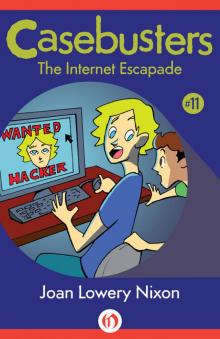 The Internet Escapade
The Internet Escapade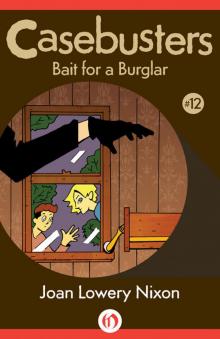 Bait for a Burglar
Bait for a Burglar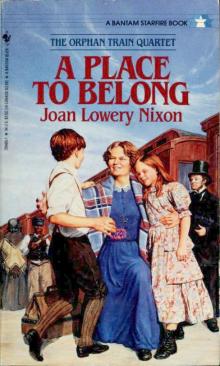 A Place to Belong
A Place to Belong Nightmare
Nightmare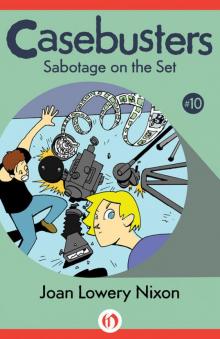 Sabotage on the Set
Sabotage on the Set The Other Side of Dark
The Other Side of Dark Whispers from the Dead
Whispers from the Dead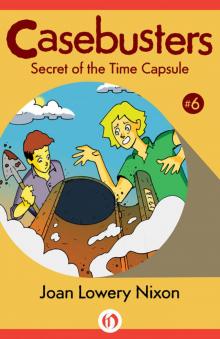 Secret of the Time Capsule
Secret of the Time Capsule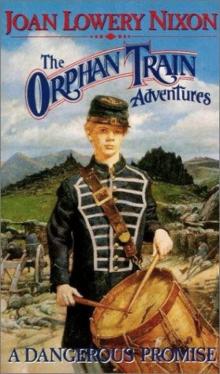 A Dangerous Promise
A Dangerous Promise Laugh Till You Cry
Laugh Till You Cry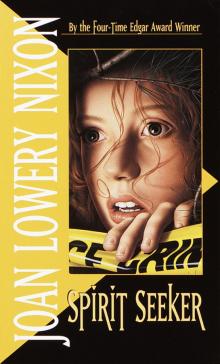 Spirit Seeker
Spirit Seeker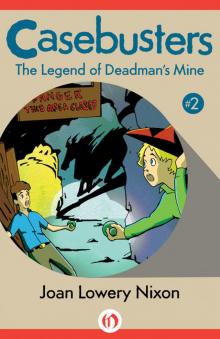 The Legend of Deadman's Mine
The Legend of Deadman's Mine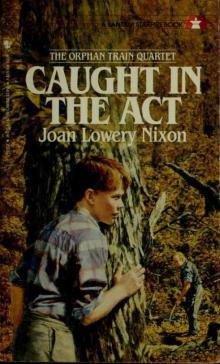 Caught in the Act
Caught in the Act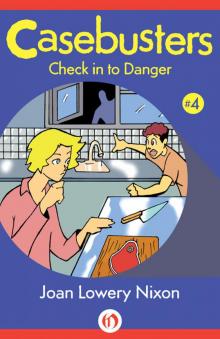 Check in to Danger
Check in to Danger Ellis Island: Three Novels
Ellis Island: Three Novels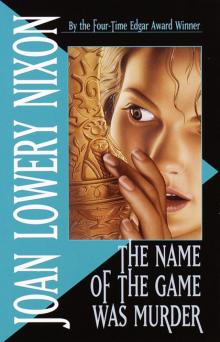 The Name of the Game Was Murder
The Name of the Game Was Murder The Haunting
The Haunting Lucy’s Wish
Lucy’s Wish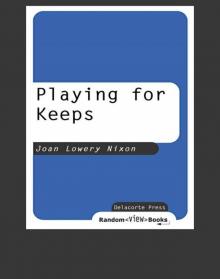 Playing for Keeps
Playing for Keeps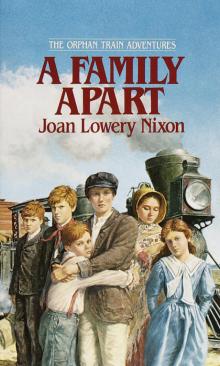 A Family Apart
A Family Apart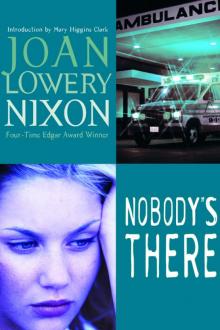 Nobody's There
Nobody's There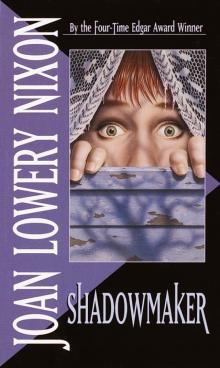 Shadowmaker
Shadowmaker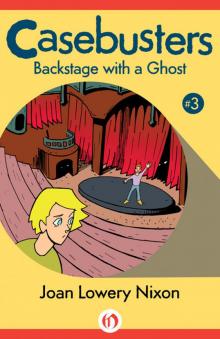 Backstage with a Ghost
Backstage with a Ghost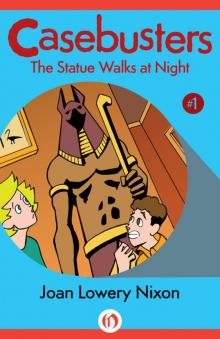 The Statue Walks at Night
The Statue Walks at Night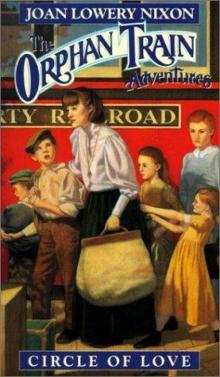 Circle of Love
Circle of Love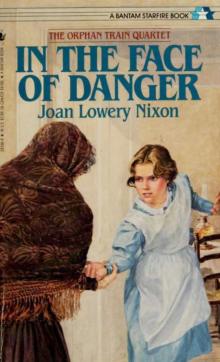 In the Face of Danger
In the Face of Danger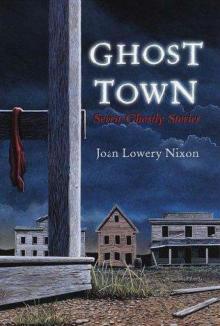 Ghost Town
Ghost Town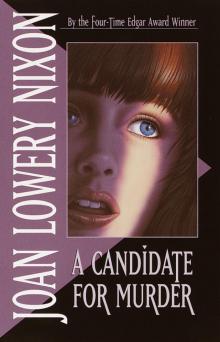 A Candidate for Murder
A Candidate for Murder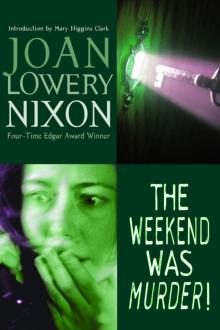 The Weekend Was Murder
The Weekend Was Murder The Island of Dangerous Dreams
The Island of Dangerous Dreams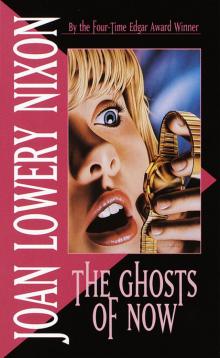 The Ghosts of Now
The Ghosts of Now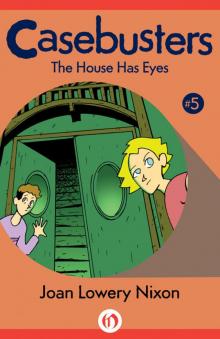 The House Has Eyes
The House Has Eyes The Dark and Deadly Pool
The Dark and Deadly Pool Keeping Secrets
Keeping Secrets Secret, Silent Screams
Secret, Silent Screams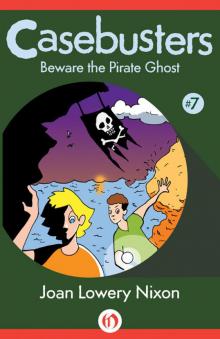 Beware the Pirate Ghost
Beware the Pirate Ghost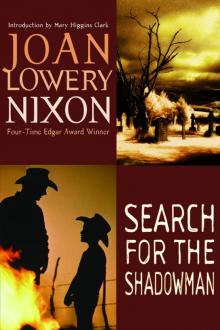 Search for the Shadowman
Search for the Shadowman Haunted Island
Haunted Island